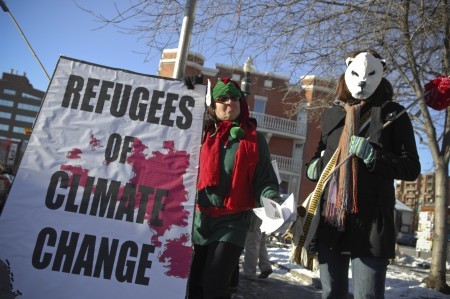By Yaron Berkowitz
I was always puzzled by the climate change debate. In the early 1990s, it was becoming apparent that increasing amounts of evidence indicated that human activity was rapidly changing the earth’s atmosphere and climate. It seemed the world was determined to respond and willing to make dramatic changes to the way in which we produce and consume energy.
However, after the Kyoto Agreement was signed in 1997 something changed and the climate change sceptic was born. Though scientists could prove human-induced climate change was occurring, with potentially catastrophic consequences, the media began to report that climate science might not be absolute and scientists may be exaggerating the real facts. Certain climate conspiracy theories became more popular. Perhaps climate change is just a way for the government to create new taxes. Maybe it is environmentalist movement hogwash. Many started to believe the entire scientific community was part of a climate conspiracy and cannot be trusted. ‘Sceptic scientists’ suddenly emerged and demanded more balanced coverage in the media.
These claims always seemed odd to me. The giant fossil fuel corporations that provided the world’s energy output always held all of the money and power. They had access to politicians and decision makers, not the environmentalists. I could never understand the reason for governments to promote problems that require a massive amount of money and resources to remedy and would involve unpopular changes to our lifestyle. Fifteen years ago, the majority of the public believed that climate change was real and we have to take immediate action. Today, the public is divided. Why, despite even more convincing science, is humanity so fragmented?
I decided to read more in order to try to understand the issue better and found two interesting books that explained in a concise and intelligent way what was happening:
- Merchants of Doubt: How a Handful of Scientists Obscured the Truth on Issues from Tobacco Smoke to Global Warming – by Erik M. Conway and Naomi Oreskes.
- Climate Cover-Up: The Crusade to Deny Global Warming – by James Hoggan and Richard Littlemore.
I found that yes; there is a conspiracy. But not one created by the environmentalists. Rather one that is produced and funded by the fossil fuel industries and their partners, the free market libertarians. Reading these facts made me very angry. How, in the name of self-interest, were these rich companies willing to risk the future of our entire planet and humanity? This disregard for our concerns is not new, as apparent in the tobacco industry’s campaign to deny all evidence of the harm caused by smoking. But haven’t we learned anything? How are we so easily manipulated that we ignore the blatantly obvious?
I believe that the first thing anyone should do before looking at the climate change debate is to understand the politics behind the matter and understand the qualifications and the methods of information dissemination used by each party. There are not two scientific views here – there is the scientific view and the climate sceptics’ view, which is based on clear political agenda – to avoid government regulations in any cost. And if the climate sceptics need to fight the facts, they will do whatever is required to make sure that the public remains in a state of confusion.
The strategy is very similar to certain religious groups that deny evolution by writing their own version of history presented by ‘experts’ and then demanding ‘balance’ from the media and education system. In both cases, there are irrefutable scientific facts versus non-scientific, ideological deniers’ version of the situation. In both cases, people who tend to believe in the group ideology – God or the Free Market – are a very easy catch.
Reading the following books helped me not only to understand the politics of climate change but also to become a more intelligent reader of similar debates in the future. We must understand that it is important to check the credentials of people who make incredible claims and give themselves titles they have note earned and do not deserve.
To make it easier for the reader, here is a list of excellent resources about climate change:
- Real Climate – Real Science from Climate Scientists – A website that explains the science to non-scientists.
- RC Wiki – a supplement to the above website. It is primarily an index for debunking climate-change myths.
- DeSmog Blog – Clearing the PR Pollution That Clouds Climate Science. Climate cover-up authors James Hoggan and Richard Littlemore are main contributors to this excellent blog.
- Intergovernmental Panel on Climate Change (IPCC) website. The IPCC is the leading international body for the assessment of climate change. It was established by the United Nations Environment Programme (UNEP) and the World Meteorological Organization (WMO) in 1988 to provide the world with a clear scientific view on climate change and its potential environmental and socio-economic impacts.
Headline photo by Tavis Ford, Itsaniceday.

